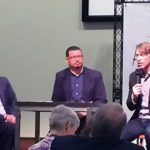WACO—Christians must be moved by what moves God— concern for the poor, a South African pastor and social entrepreneur told a Baylor University conference on global poverty.
Speakers at the “Bottom-Up Approaches to Global Poverty” conference stressed the urgency of fighting poverty by empowering the poor through appropriate technology, social entrepreneurship and the life-changing gospel.
|
Participants at a global poverty conference at Baylor University heard speakers offer diverse ways to reduce poverty.
|
As pastor emeritus of Ebenezer Evangelical Church in Soweto, South Africa, chairperson of Empowa Invest-ments and director of Youth Alive Development Founda-tion, Caesar Molebatsi has dedicated his life to change through transformation, justice and reconciliation.
When Christians in the West discuss poverty reduction, they tend to focus on relief rather economic em-powerment, he observed.
“What the world really needs today in my experience is economic empowerment … enabling people to use their assets that are God-given,” he said.
Molebatsi believes real development occurs when there is a growth of confidence and self-interest through education, organization and discipline.
This is accomplished best by enabling the poor to have an enterprise—a mindset and skill-set that can turn opportunities and ideas into realities, he insisted.

Caesar Molebatsi, chairperson of Empowa Investments, director of Youth Alive Development Foundation and pastor emeritus of Ebenezer Evangelical Church in Dobsonville, Soweto, South Africa, speaks to a global poverty conference at Baylor University. (PHOTOS/Baylor University)
|
Social entrepreneurs are leaders who understand power and use it wisely to translate benevolent goals into reality, Molebatsi said. He identified five characteristics that describe a social entrepreneur—change-friendly, opportunity-oriented, innovative, resourceful and creative.
Sign up for our weekly edition and get all our headlines in your inbox on Thursdays
These leaders intentionally pursue the public good because of three driving forces—the redemptive purposes of God, relationships and leadership, he added.
Combating poverty demands asking the crucial question, “Lord, what would you have us do?”
About 3 billion people live on less than $2 a day, and “what we are doing now about poverty simply isn’t working,” said Paul Polak, founder of International Development Enterprises, an international nonprofit poverty-alleviation organization that develops and markets affordable income-enhancing technologies in developing countries.
Of the world’s 1.2 billion who live on $1 a day, 800 million earn their living from tiny farms, and 85 percent of the 525 million farms are less than five acres, Polak noted.
His nonprofit company developed the treadle pump—human-powered irrigation pumps that revolutionized small farming, which cost $25 for a farmer in Bangladesh.

Ken Eldred, chief executive officer of Living Stones Foundation Charitable Trust and author of "God is Work," spoke at the conference.
|
He noted 2.1 million poor families in Asia and Africa invested $50 million in treadle pumps, increasing their net income by $210 million a year.
“You make the design so simple and the materials so attainable so the people can fix them themselves,” Polak said.
Ken Eldred, chief executive officer of Living Stones Foundation Charitable Trust and author of God is Work, asked participants at the Waco conference, “If God had an interest in business, what would his interest be?”
Along with social and financial capital, Eldred said, spiritual capital is key to bringing integrity into the business world.
In the secular world, people strive for self-preservation, but in the kingdom of God, people live for integrity and the common good, Eldred said. Business problems arise because people become different at home and at work.
“We need to be sure our faith is integrated in truth, in business,” Eldred concluded. “When we begin to work under (God’s) rules, we will begin to see success.”
J. Andrew Kirk, former dean and head of the School of Mission and World Christianity at Selly Oak Colleges, said the church historically has given special attention to the poor—but not always in good ways.
“At the best, they are the objects of charitable donations,” Kirk said. “At the worst, they are despised and condemned.”
The reality of the poor is taken seriously in the Bible, and the solution is moving from alleviation to justice and liberation, he stressed. Compassion, generosity and justice are the biblical responses to poverty.
Compassion means the poor must never become invisible, he explained.
“Generosity springs from the heart of people who know that they owe their life to the generosity of God,” he said. “Generosity is measured by how we respond to those who can never repay us.”
And justice is shaping the world according to the nature of God.
“Justice is what God does, for justice is what God is,” Kirk said.














We seek to connect God’s story and God’s people around the world. To learn more about God’s story, click here.
Send comments and feedback to Eric Black, our editor. For comments to be published, please specify “letter to the editor.” Maximum length for publication is 300 words.